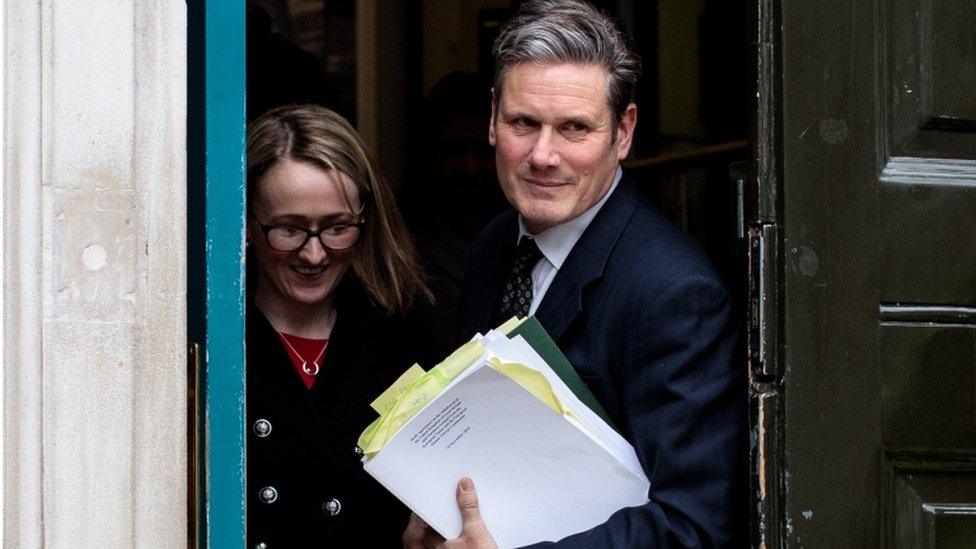Brexit: Will cross-party talks go anywhere?
- Published

The Labour Party's negotiating team consists of Rebecca Long Bailey and Sir Keir Starmer plus officials
It is almost the end of another very long and fractious week in Westminster (although their lordships look like they'll be going for quite some time yet).
But the main item of business in the last frantic 24 hours has been the cross-party talks between the Conservatives and the Labour Party.
From both sides, it sounds like they are serious and genuine, and negotiators got into the guts of both their positions and technical details on Thursday.
Remember, behind the scenes there isn't as much difference between the two sides' versions of Brexit as the hue and cry of Parliament implies.
But the political, not the policy, distance between the two is plainly enormous. I'm told there might be more contact tonight between the two sides, although not more face to face talks until Friday.
And there is scepticism in Labour circles over whether the government is doing more so far than trying to explain merits of its deal, rather than suggest areas where they might be willing to budge.
Sources involved in the process suggest that there is yet to be the promise of a big move from Theresa May, a promise about the price she is willing to pay for Labour support.
But the talks are not just a stunt and there are suggestions it might be clear by Friday afternoon, if the process will actually be able to deliver an outcome.
Brexit Secretary Stephen Barclay is part of the government's negotiating team
Talks, as we know, often turn to more talks, and more talks, and more talks.
You don't need me to remind you, when Theresa May has the option of playing something long, which choice she makes.
There is, though, the obvious deadline of the prime minister's trip to Brussels next week, where she has to present something to her EU counterparts, in order to justify asking for another delay.
But presenting something is not the same as having to deliver a fully worked-out deal with every "i" dotted, every "t" crossed.
It would be an enormous political turnaround if a fully worked out cross-party compromise emerges by then, that can last.
But after months of Brussels pondering openly why the UK has not been able to work in a cross-party way, if Theresa May can show evidence that that process is under way, perhaps that will be enough.
One cabinet minister suggested to me today that, if they can show there isn't a "permanent standoff" in Parliament between the two main parties, then the EU will give the UK more time.
Don't forget though, behind the scenes, some Brexiteers are still trying to organise to push for departure from the EU next week.
Labour has a problem too - a big split over whether they could accept compromise to deliver Brexit, without the promise of another referendum.
Theresa May and Jeremy Corbyn may have a lot of gaps to bridge between them, but they have gaps among their own sides too.